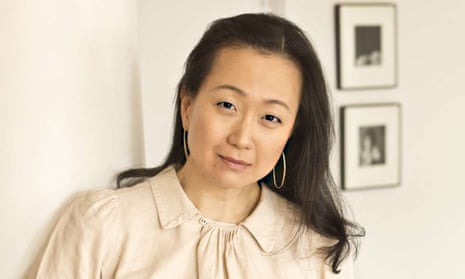Throughout 2018 – the bicentennial of Frederick Douglass – The Antiracist Research and Policy Center at American University and the Frederick Douglass Family Initiatives are honoring 200 individuals whose modern-day work best embodies Douglass’s enduring legacy of social change. The Guardian is publishing the names of all 200 honorees – 10 each week – between now and November.
Here, Christopher Petrella, director of advocacy and strategic partnerships at The Antiracist Research and Policy Center at American University, speaks to one of the honorees, Min Jin Lee.
Min Jin Lee is a National Book Award finalist, whose writings wrestle with the themes of race, class, diaspora, religion and love. The New York Times Book Review called her most recent novel, Pachinko, one of the 10 Best Books of 2017. Lee is a recipient of fellowships from the Guggenheim Foundation and the Radcliffe Institute for Advanced Study at Harvard.
CP: Pachinko is a novel about Koreans in Japan. You note that, in general, Koreans in Japan fall into three categories: North Koreans living in Japan, South Koreans living in Japan and ethnic Koreans with Japanese citizenship. What can this type of arrangement teach us about identity, migration and movement in the US context?
MJL: I’m going to sound like an optimist here. We are having a dark moment in the American political climate regarding undocumented migrants and asylum seekers but, then again, the history of immigration in America has always been checkered.
In the United States we have two competing mythologies about immigration. On the one hand, we believe that different kinds of races make up an American person. On the other, a deep nativist strain keeps resurfacing. Nevertheless, there has also been strong resistance to nativism. Frederick Douglass, for instance, called the United States a “composite nation” when he argued against the Chinese Exclusion Act [of 1882].
CP: In your view, what is the role of the social novel in political resistance? What is the role of art in political movements and political movement making?
MJL: All art is political because it is created by people. I explicitly intended to write political novels. My first book [Free Food for Millionaires] is a critique of class and immigration in America. My second novel is about Koreans in Japan in relation to colonialism and xenophobia. Both novels deal with themes of immigration, race and homeland. Primarily, they speak to what the diaspora does and means for people who are scattered throughout the world. My third novel, American Hagwon, will complete my triology; the novels are unrelated in characters, but related by the theme of diaspora.
Political novels can be boring to read unless written effectively with the powerful tools of fiction; I was trying to do this. I want my books to be pleasurable and edifying. Though Frederick Douglass didn’t write fiction, his speeches have great narrative power because he integrates storytelling tools elegantly with his political analysis.
Christopher Petrella (CP): The opening line of Pachinko, your latest novel, reads: “History has failed us, but no matter.” What inspired such a powerful idea?
Min Jin Lee (MJL): “History has failed us, but no matter” serves as my thesis statement. I believe history has failed almost everybody who is ordinary in the world, not just the Korean-Japanese, who are the subject of Pachinko. I am also arguing that the discipline of history has failed. It is not that historians aren’t doing their jobs but rather that the memory of history has been reconstructed by the elite, because the overwhelming majority of ordinary people rarely leave sufficient primary documents; they do not have others recording their lives in real time.
The phrase “but no matter” is a statement of defiance. It doesn’t matter that history has failed us because ordinary people have persisted anyway. This idea gives me an enormous amount of strength and hope as a writer because I am an ordinary person. Those of us who may be women of color, immigrants, or working class aren’t often meant to be people who write novels about ideas, but no matter.
CP: When did you first learn about Frederick Douglass and how has he contributed to your own political consciousness?
MJL: I first learned about Frederick Douglass as a child in school. However, as I got older, I read his writings and gained a different sort of respect for him and his work. Douglass defies every category. Most people think of him as an abolitionist and orator, but I see him as a writer who comes from an “outsider” background. He was primarily self-taught and freed himself literally from nearly every possible cage.
His path to freedom serves as both an amazing metaphor and literal truth. Above all, he wasn’t someone who escaped, reached his destination, then closed a door. He kept it open at great cost to himself, and he argued for the rest of his life to include other groups like Native Americans, women and immigrants. He’s a vital and necessary example of what humanity can do.
- Christopher Petrella, PhD, is the director of advocacy and strategic partnerships at the Antiracist Research and Policy Center at American University. His forthcoming book is entitled Crimes of this Guilty Land: Histories of White Supremacy in New England (Haymarket Books).
